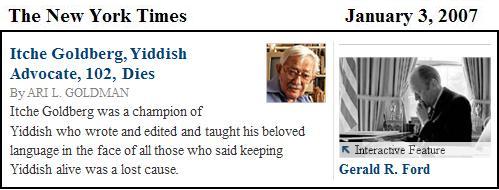Readings for wise men
on the date of
T. S. Eliot's death:
"A cold coming we had of it…."
"… a Church is to be judged by its intellectual fruits, by its influence on the sensibility of the most sensitive and on the intellect of the most intelligent, and it must be made real to the eye by monuments of artistic merit."
— T. S. Eliot, For Lancelot Andrewes: Essays on Style and Order, published by Faber & Gwyer, London, in 1928.
The visual "monuments of artistic merit" I prefer are not those of a Church– except, perhaps, the Church of Modernism. Literary monuments are another matter. I recommend:
The Novels of Charles Williams, and
on style and order:
Eliot's essay on Andrewes begins,
"The Right Reverend Father in God,
Lancelot Bishop of Winchester,
died on September 25, 1626."
For evidence of Andrewes's
saintliness (hence, that
of Eliot) we may examine
various events of the
25th of September.
In Log24,
these events are…

Aloha.

It seems that I am
somewhat out of step with
the Anglican Communion…
though perhaps, in a sense,
in step with Eliot.
Note his words in
"Journey of the Magi":
Birth or Death? There was a Birth, certainly, We had evidence and no doubt. I had seen birth and death, But had thought they were different; this Birth was Hard and bitter agony for us, like Death, our death.
See also entries for
Dec. 27, 2006 (the day of
Itche Goldberg's death) —
— "Least Popular
Christmas Present
Revisited" —
and for the same date
three years earlier —
"If you don't play
some people's game, they say
that you have 'lost your marbles,'
not recognizing that,

while Chinese checkers
is indeed a fine pastime,
a person may also play dominoes,
chess, strip poker, tiddlywinks,
drop-the-soap or Russian roulette
with his brain.
One brain game that is widely,
if poorly, played is a gimmick
called 'rational


